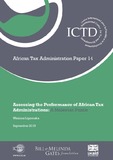| dc.contributor.author | Ligomeka, Waziona | |
| dc.coverage.spatial | Malawi | en |
| dc.date.accessioned | 2019-09-16T15:31:29Z | |
| dc.date.available | 2019-09-16T15:31:29Z | |
| dc.date.issued | 2019-09-16 | |
| dc.identifier.citation | Ligomeka, W. (2019) Assessing the Performance of African Tax Administrations: A Malawian Puzzle, ICTD African Tax Administration Paper 14, Brighton, IDS. | en |
| dc.identifier.isbn | 978-1-78118-588-9 | |
| dc.identifier.uri | https://opendocs.ids.ac.uk/opendocs/handle/20.500.12413/14699 | |
| dc.description.abstract | We lack good indicators of the quality of national tax administrations, especially for low-income countries. The situation is, however, improving. Through the relatively new TADAT process (Tax Administration Diagnostic Assessment Tool), an increasing number of national tax administrations are receiving scores from teams of peer reviewers on how well they perform in nine key functions. That scoring process is intended primarily to serve management purposes, i.e. to indicate areas for potential performance improvement. But the TADAT scores are, inevitably, widely viewed as performance rankings. A revenue administration with a higher average TADAT score will be viewed as ‘better’ than one with a lower score. But how accurate are these implicit rankings? An analysis of the case of the Malawi Revenue Authority raises important questions about both the rankings and the broader question of how to identify good tax administration. The authority’s TADAT scores are very low. But its actual revenue collection performance is relatively good: compared to other countries in sub-Saharan Africa, it collects a relatively high proportion of GDP in tax, and is particularly successful in collecting direct taxes, especially from larger companies. A very high proportion of revenues are collected by the small Large Taxpayers Unit. Yet the unit uses only very basic digital technology to keep records on those companies. This is a puzzle. The likely explanation is that a small number of staff successfully monitor larger companies for revenue collection purposes using relatively informal, low-tech methods. There are two broader implications. One is that performance can vary considerably between different parts of the same organisation, and performance indicators intended to apply to the organisation as a whole may be misleading. The other is that we still have some way to go in both understanding and measuring the factors that lead to good tax administration. | en |
| dc.language.iso | en | en |
| dc.publisher | IDS | en |
| dc.relation.ispartofseries | ICTD African Tax Administration Paper;14 | |
| dc.rights.uri | http://creativecommons.org/licenses/by-nc/4.0/ | en |
| dc.subject | Economic Development | en |
| dc.subject | Finance | en |
| dc.subject | Governance | en |
| dc.title | Assessing the Performance of African Tax Administrations: A Malawian Puzzle | en |
| dc.type | Series paper (non-IDS) | en |
| dc.rights.holder | © Institute of Development Studies 2019 | en |
| dc.identifier.team | Governance | en |
| dcterms.dateAccepted | 2019-09-16 | |
| rioxxterms.version | VoR | en |


